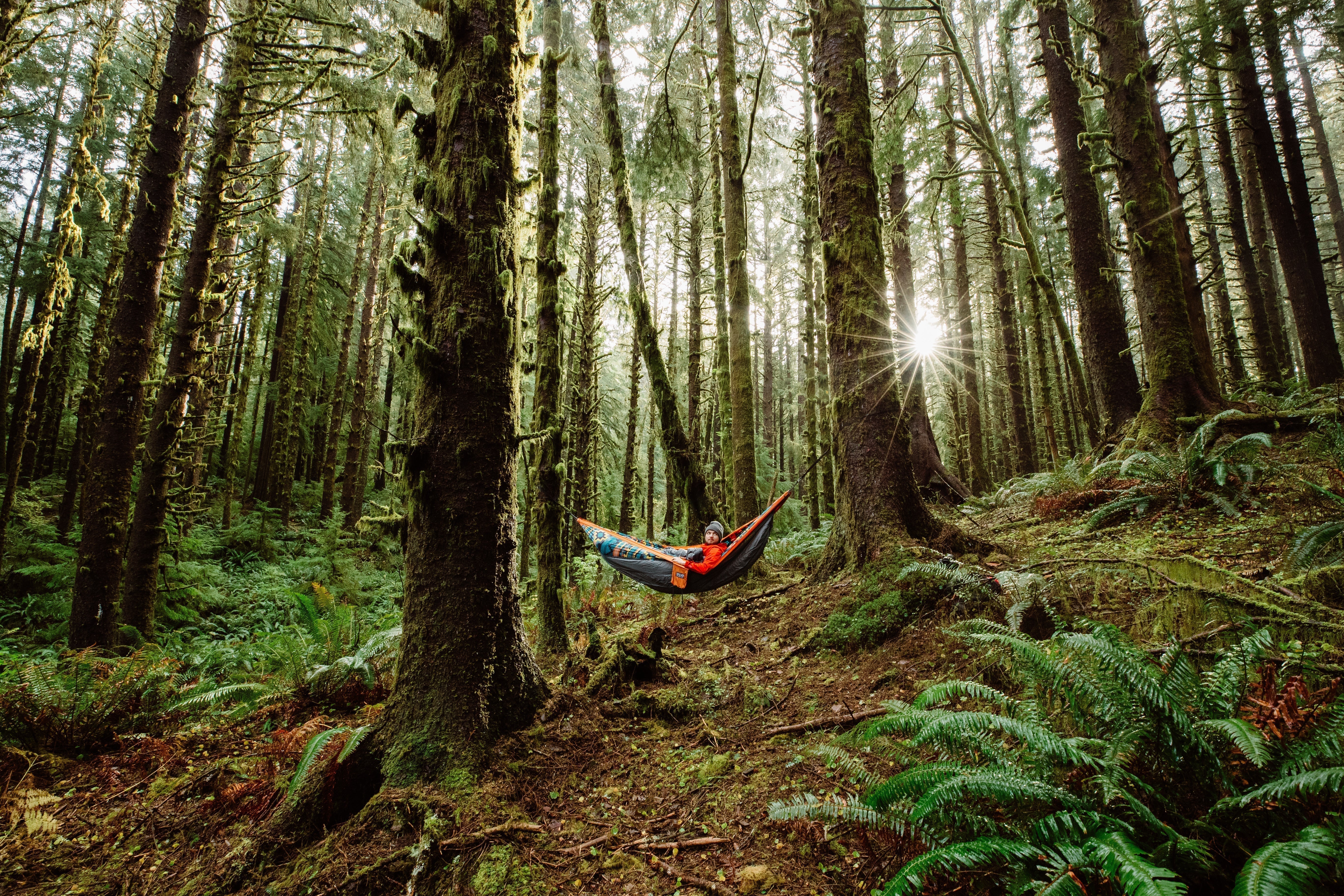At Eagles Nest Outfitters, we’re proud to support campers who care about the environment as much as we do. Whether you’re camping in one of our lightweight hammocks or traveling in an RV, the principles of eco-friendly camping help you reduce your carbon footprint and enjoy nature responsibly.
Opting for local campsites, solar energy, and reusable gear all embody the ENO commitment to sustainable, comfortable outdoor experiences with minimal impact. Our hammocks are designed to leave minimal trace, letting you relax above the ground without disturbing the earth.
A Greener Footprint
By reducing your travel time and distance, you can reduce your carbon footprint. Choose to camp locally to reduce fuel impact by camping in your state rather than across the nation. Stay in one campground for longer periods of time rather than hopping from camp to camp every few days during your trip. Calculate your carbon footprint while camping, which determines how much carbon dioxide your camping excursion is dumping into the environment. You can purchase carbon credits from sites including TerraPass to offset your carbon usage while camping. For the use of electricity in an RV, check with energy suppliers to determine estimated usage amounts while camping so you can offset your carbon footprint.
Some campers prefer to enjoy nature with nothing but a thin sheet of material in between them and the stars. But some enjoy the comforts of a conversion van or RV. While purists may look down their noses at these behemoths in the woods, eco-friendly RV options, such as EverGreen RVs, are becoming more common.
RV Camping goes Green
RV campers are going green by reducing weight through the use of aluminum and composite materials. This reduces the amount of weight being pulled and therefore the amount of fuel used per mile. Additionally, RVs made from natural resources like wood reduce the demand on the environment and therefore are more eco-friendly. The use of mold and mildew resistant materials on RVs reduce the need for cleaning with chemicals, while eco-friendly insulation helps reduce the need for heating and cooling elements.
Solar Powering RVs
The most environmentally sound way to power up an RV is through wind turbines and solar power units. A small solar electric or photovoltaic (PV) system is a pollution-free alternative to generating electricity in a system of any size. Solar systems can be used with an electrical distribution system, referred to as grid connected, in addition to being off the grid with stand alone units, which are ideal for camping in rugged environments. Solar panel systems can be used for powering outdoor lighting, cooking elements, heating and electrical outlet power. The Recreational Vehicle Industry Association states that RV manufacturers are becoming more accommodating to green camping through the manufacturing of lightweight towables and fuel efficient motor homes. Additionally, the RHIV notes solar panels are becoming more commonplace on new RVs.
Gadgets and Garbage
When camping, leave your laptop, video games, microwaves and electrical coffee makers at home so you can unwind and reconnect with nature. However, you’ll most likely benefit from certain gadgets while camping. Choose wind-up or solar powered flashlights, radios, torches and phone chargers in place of electrical or battery operated devices, suggests the Missouri Department of Natural Resources.
Reduce waste by taking non-disposable items whenever possible. Take dishes, cups and cutlery from your home and wash these while camping in potable water. Use composting bags for garbage that can be composted and either take these back with you to add to your home compost or deposit them in a trash unit on site. Try not to use anything that cannot be composted, such as aluminum, glass or plastic. If you do use these recyclable items, recycle them after departing the campground. Do not leave anything, including food scraps, in your campsite and uphold the Leave No Trace Seven Principles to make it to look like you were never there.
Food for Thought
For cooking, burning trees is far from eco-friendly. However, if you gather dead brush and fallen tree branches you are creating less of an environment impact in comparison to other cooking methods. Burning wood is more natural, releases far fewer toxins and assists the natural process of decay more than the use of charcoal, propane or butane tanks. Of course, you can also depend on solar energy to boil water or heat up foods – if you are fortunate enough to camp in a sun-soaked environment.
The best remedy here is to avoid cooking altogether. Bring foods that are nonperishable or capable of remaining fresh in an environmentally safe cooler filled with ice. You can enjoy fresh vegetables, fruits, bread, nuts and precooked beans, as well as premade snacks including air popped popcorn, granola, and meat jerky. For recipes that are ideal for camping, California State Parks offers healthy, vegetarian recipes. The Wisconsin Department of Natural Resources lists several kid-friendly camping recipes that can be made over a campfire.





Share:
Ultralight Backpacking
ENO and SweetWater Brewing Company Create the Ultimate Relaxation Station with the SweetWater DoubleNest Hammock